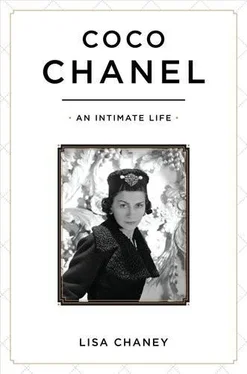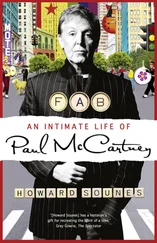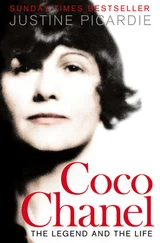This “queen” remained at the salon until two or three o’clock, depending upon the importance of her customers. And then “she retired to her drawing room, where she entertained a great deal.” 12The impression this gives — that Gabrielle didn’t work hard — was just what she intended, and is also entirely inaccurate. And one remembers her famous remark, made years later: “It is through work that one achieves. Manna didn’t fall on me from heaven; I molded it with my own hands… The secret of this success is that I have worked terribly hard… Nothing can replace work; not securities, or nerve, or luck.” 13
At the same time, as we have seen, Gabrielle had insisted on remaining in the background when she sold hats from Etienne Balsan’s garçonnière , sending her assistants out to deal with the customers rather than meeting them herself. And over the preceding few years, as she had become familiar with people and surroundings of the highest sophistication, the impression that would sometimes be given, that Gabrielle didn’t do much work, signaled something significant in her present thinking. She had recognized that in order to acquire a greater reputation than her fellow designers, she would be wise to cultivate the impression that she didn’t need to work hard; that, by implication, she was the equal of her clients. Having had her nose rubbed in her social inferiority throughout her life, as Gabrielle grew more successful, she felt less and less a sense of personal inadequacy before those more socially exalted than herself.
Under Arthur’s watchful eye, at first using her contacts and the press to promote her hats, Gabrielle’s keen instincts had begun telling her she needed something more all-encompassing than the old-fashioned virtue of a well-known name. However consciously, we will never know, Gabrielle began fostering something on a grander scale.
Even her première , who knew Gabrielle’s working methods and something of her complex personality, was persuaded enough by her projection of status to call Gabrielle “a queen,” and misinterpreted her entertaining as no more than that — entertainment. As Gabrielle’s innate self-belief began to flourish, she was also drawing the outlines of a persona. She was cultivating around her name something that can thrive on any real scale in the modern world only through an ongoing relationship with the press: a public image.
12. The War Bans the Bizarre
Even during the war, the upper echelons of French society, with whom Arthur had always passed his time, still dedicated much of theirs to leisure. The nobility was no different from other classes in being made up of various elements — including from intermarriage with the grande bourgeoisie —and was neither an assimilated nor a homogenous group. Yet while no longer retaining much power, they nonetheless retained much of their old sense of exclusiveness and still enjoyed great status. Conferring prestige and receiving deference from those around them, they confirmed the existence of a social hierarchy at whose apex they had remained.
Arthur was a haut bourgeois imbued with the idea that work was commendable. However, with no need of money, and having transformed his work ethic into an almost existential need for experience, he was also one of the few from the upper classes unconventional enough to live with his mistress. In addition, he was sufficiently forward thinking that he found subservience in a lover ultimately unrewarding. Gabrielle was compellingly unsubservient. And despite her lack of education (perhaps “cultivation” is a better word, as there were so few women in this period who had much of a formal education to speak of), her outstanding natural intelligence was clearly a match for Arthur’s. Gabrielle was the only woman he had ever met who appeared to be his equal. And yet, however strong his love and admiration for her, these feelings had done little to curb his prodigious appetite for women.
In the first flush of their affair, Arthur’s need for conquest was temporarily held in check, but it wasn’t long before his compulsion had asserted itself once again. As for Gabrielle, she apparently felt reassured in the belief that she was Arthur’s only real love. Saying she felt no jealousy, she even asked him who his other lovers might be. But Arthur’s tastes ranged wide, and he laughed and told Gabrielle that her knowing would only make his life more complicated than he had already made it. 1
In addition to these private “complications,” Gabrielle’s lover managed his fleet of ships and his now enormous coal interests and ceaselessly shuttled between the front, Paris and London. Yet whatever his work-related absences or the brief spells in other women’s arms, Arthur always returned to Gabrielle, his most significant companion.
By the beginning of 1916, when the war showed no sign of ending, Arthur’s experiences had stimulated his interest in a more political role. Accordingly, in March, he requested permission to resign his intelligence service commission in the hope of being taken on as a liaison officer instead. He had made it his business to become acquainted with both politicians and senior commanders in the French and British armies. Perhaps with a nudge from someone high up, the British War Office wrote to the commander in chief of the British army in France saying that Arthur wished “to go to Paris in order to carry out his ordinary business. It is probable that this… may involve his participation in French political affairs. In these circumstances it would be very inadvisable for him to retain his… commission and the status of a ‘British Officer on leave.’” 2It appears that there were also more personal reasons for Arthur’s resignation of his commission. Working in such a stressful occupation near the battlefields of the front — and the death of his friend Hamilton-Grace, for which he held himself responsible — had reduced him to a state of emotional exhaustion. “His health broke down and he had to resign his inter-pretership in the field” was how a commentator would put it. 3Either Arthur himself, or a doctor, had recognized that in order to recover, he must take a job away from the front.
Arthur’s chaotic times and privileged background had made him a worldly skeptic who, until the war, had pretty much done what he wanted. He had, after all, described himself to Gabrielle as a cheerful pessimist whose dictum “One does not have to hope in order to undertake” had enabled him to sign up for active service without much conviction. Yet the appalling suffering and loss of life he had witnessed had not reduced Arthur to a state of bitterness and demoralization. Instead, his religious faith had provoked in him a renewed sense of hope. Ironically, this change was to set in motion a series of grievous results.
For the moment, however, Arthur did believe in a future, and in a utopian spirit away from the front, he set out to write a book. He often showed Gabrielle what he was writing.
By the end of that year, 1916, Gabrielle was becoming more self-reliant. Her business was so prosperous she chose to return all of the three hundred thousand francs Arthur had invested in her salon at Biarritz. And if his frequent absences were not only on war business, Gabrielle by no means languished at home. If her comment “I was my own master, and I depended on myself alone,” made later in conversation with Morand, was made with some defensiveness in relation to Arthur’s absences, it was also increasingly the case. There was no question of Gabrielle’s sincerity when she declared that Arthur “was well aware that he didn’t control me.” This, of course, was part of her attraction for him. And yet with regard to supporting her ventures, this was the point at which Arthur made that melancholy statement to Gabrielle referred to in the prologue to this book. Characterizing the problems men and women faced when trying to devise new ways of relating to one another, he said: “I thought I’d given you a plaything, I gave you your freedom.” 4
Читать дальше












